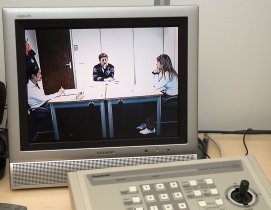Video Labs
Complementary to the opportunities for research afforded by the cubicles, group laboratories can greatly enhance the external validity (i.e., resemblance with real life situations) of the research and its findings. Whereas cubicles allow for the study of group processes in a more "pure" or abstract sense, research done in group laboratories acknowledges the richness and complexity of group dynamics resulting from interactions between actual, physically present, group members.
A lot of time and effort is consequently invested in documenting and scoring relevant interactions to abstract from the specific groups and to generalize the findings to a broader audience. Group laboratories have clear relevancy for management related research (e.g., problem solving in multidisciplinary teams) as well as research into educational renewal and curricular reform issues (e.g., problem-based learning). By studying students in actual group settings, performing under different instructions, ingredients for successful interactions can be identified. Furthermore, by coupling the laboratories, a deeper insight can be gained into the processes at work in a distance- or e-learning situation in which (groups of) students or work teams virtually collaborate with each other.
The EBL currently hosts two group labs where group interactions can be recorded digitally. An additional two rooms are under preparation for studying the interaction between groups.
View the EBL photos.

Participants of a group experiment

Camera

The control room

Recording the group experiment


